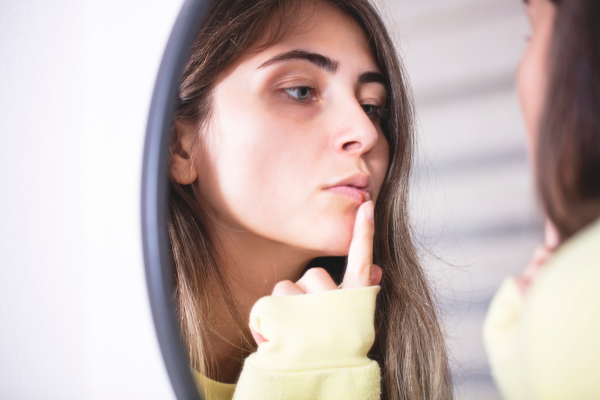
Ah, so annoying… Cold sores are not exactly something that makes you very happy. But what exactly is a cold sore? What causes it and what can you do about it? And how contagious is it exactly? We answer these questions for you in this article!
A cold sore is a small, fluid-filled blister that forms on or around your mouth. You can often find them on your lips, around your mouth and in your mouth. It also happens that you have a few that are close to each other. Cold sores often start with a crazy tingling sensation on your lip, followed by small bumps that then turn into painful blisters. After a few days it can become a blister and often form a scab. It usually heals on its own within one to three weeks.
Read also :'Is it true that you get cold sores faster in the summer?'
Cold sores are caused by the herpes simplex virus. You may be startled by the term 'herpes', but it is actually a very common virus. Many people also often contract this virus during their childhood. Although herpes is classified as an STD, you do not need to have contracted it sexually.
Unfortunately, herpes is a chronic virus, so you can never fully recover from it. This means that you will likely have cold sores every now and then throughout your life, often triggered by the following factors:
Cold sores are caused by the herpes simplex virus and it is indeed contagious. You can also transmit your cold sore by kissing, having oral sex and other forms of physical contact. Think of drinking from the same glass, using the same cutlery or sharing lipstick. However, in general the rule applies:'the more contact you have, the greater the chance that you will transmit the virus'. In other words, you are more likely to transmit the virus through skin-to-skin contact than by drinking from the same glass.
Technically speaking, you are not only contagious while you have a cold sore, because you always carry the virus. However, there is a greater chance that you will transmit the virus while you have a cold sore. You don't have to worry about the virus spreading to the rest of your body, because once you get it orally, your body makes antibodies for it. You can, however, transfer it to another person on the body, such as genitals.
Okay, so you can't get rid of your cold sore forever, since herpes is in your body. However, you can do a number of things to reduce your cold sore symptoms.
1. Use antiviral medication
Since cold sores are caused by a virus, taking antiviral medication may help. There are a number of prescription ointments and a variety of prescription oral medications. It is best to discuss with your doctor what the best treatment is for you.
2. Take a painkiller
If your cold sore is extremely painful, you can also discuss with your doctor whether you can take painkillers or lubricate. Make sure you discuss this with your doctor first, especially if you are also taking other medications.
3. Stay out of the sun
An easy step? Stay out of the sun to avoid irritating your cold sore. Keeping your cold sore out of the sun can help it heal faster. So make sure you wear sunscreen or stay out of the sun completely. It is also better not to 'squeeze' your cold sore to prevent it from getting worse and spreading further.
4. Calm your skin
An ice pack and lip balm won't make your cold sore go away faster, but they can soothe your skin. This will make your cold sore hurt less. Try what it does for you, but stop if it doesn't seem to help.
There are a few things you can do to prevent cold sores from developing again, such as avoiding the triggers that often trigger your cold sores. Protect your skin with sunscreen and use lip balm to keep your lips moist. If you really suffer from it very often, you can discuss with your doctor whether you might be able to get preventive antiviral medication to keep the virus under control.